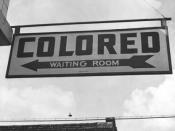The article "Heterosexism, Racism and Psychology," by Damien Riggs studies the role of privilege in research and practice. Psychological research often focuses on the effects of racism and heterosexism, rather than the benefits that some people receive by being part of a particular race or sexuality. The main idea of this article is to explore how the identities of both heterosexuals and non-heterosexuals are often left unexamined; we need to recognize how this often results in a failure to acknowledge how certain groups experience privilege as a result of the oppression of other groups (Riggs, 2006).
Every person has multiple statuses in society, which include gender, sexuality, race/ethnicity, and economic status (Riggs, 2006). These statuses tend to play a big role on whether or not a person will receive privileges in life. In the study of psychology, there still does not exist a persistent evaluation of heterosexual or white race privilege.
One of the consequences of this is that psychological research often focuses on issues of sexuality or race only occurring to non-heterosexuals (Riggs, 2006).
According to Braun, heterosexism may appear in two forms: either by commission, such as assuming a person's partner is of the opposite sex; or by omission, such as failing to challenge heterosexist statements made by others (Riggs, 2006). Precilla Choi's example demonstrates an instance in which she demonstrated heterosexism by commission and omission. While Choi had unknowingly assumed a heterosexual norm in her first focus group, she decided to bring up the idea of same-sex marriage in her next project. When she did this, it brought an uncomfortable silence to the group, which in turn hindered with the flow of the focus group and had the possibility of reducing the quality of data collected. This scenario illustrates Braun's important question: What is...


